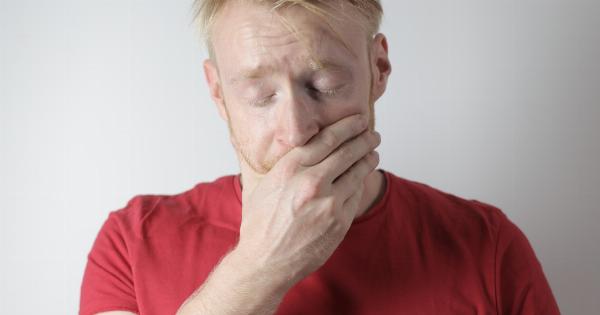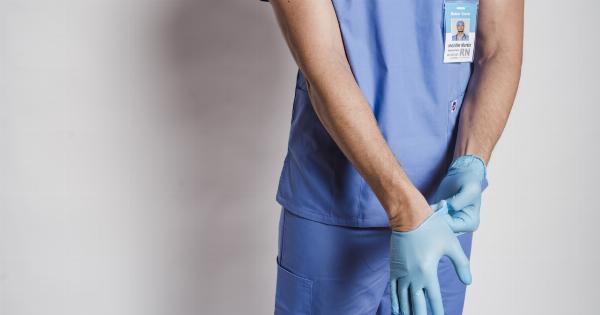Eye pressure, also known as intraocular pressure (IOP), refers to the fluid pressure inside our eyes. Maintaining a normal eye pressure is crucial for the health of our eyes and our overall vision.
When the pressure inside the eyes becomes too high, it can lead to various eye problems, including glaucoma, which can gradually impair vision and even cause blindness if left untreated.
What Causes High Eye Pressure?
Several factors can contribute to high eye pressure. Understanding these causes can help us take necessary steps to minimize and manage this condition:.
1. Primary Open-Angle Glaucoma
Primary open-angle glaucoma is the most common type of glaucoma and is caused by the slow clogging of drainage canals, resulting in increased eye pressure.
This condition usually develops gradually and often goes unnoticed until significant vision loss occurs. Regular eye exams are vital in detecting and managing high eye pressure.
2. Angle-Closure Glaucoma
Angle-closure glaucoma occurs when the drainage canals in the eyes get blocked or covered, leading to a sudden and severe increase in eye pressure.
This type of glaucoma requires immediate medical attention, as it can cause rapid vision loss and intense pain.
3. Ocular Hypertension
Ocular hypertension refers to higher than normal eye pressure without any signs of optic nerve damage or vision loss. While ocular hypertension does not always lead to glaucoma, it still poses a risk factor for developing the disease.
Regular monitoring and management of ocular hypertension are important to prevent the onset of glaucoma.
4. Eye Injuries
An injury to the eye can cause a sudden increase in eye pressure. This can occur due to trauma or blunt force impact to the eye.
It is crucial to seek immediate medical attention in the event of an eye injury to prevent any complications, including high eye pressure.
5. Medications
Certain medications, such as corticosteroids, can increase eye pressure in some individuals. Prolonged use of these medications may lead to steroid-induced glaucoma.
If you are prescribed corticosteroids or any other medication that can potentially increase eye pressure, regular eye check-ups are important to monitor your eye health.
6. Family History and Genetics
Having a family history of glaucoma or high eye pressure can increase our own risk of developing the condition.
Genetic factors play a role in determining the susceptibility to high eye pressure, and individuals with a family history should be particularly vigilant in monitoring their eye health.
How to Minimize Eye Pressure
While certain risk factors for high eye pressure cannot be changed, such as genetics, there are several lifestyle changes and preventive measures that can significantly help in minimizing eye pressure:.
1. Regular Eye Exams
Regular eye exams play a crucial role in monitoring our eye health, including eye pressure. Routine screenings can help detect any changes in eye pressure at an early stage, allowing for timely intervention and prevention of further complications.
2. Use of Eye Drops
Prescribed eye drops can effectively lower eye pressure. These drops work by reducing the production of fluid in the eyes or improving its drainage. Eye drops should be used as directed by an ophthalmologist or eye care professional.
3. Proper Nutrition
A healthy diet rich in antioxidants, vitamins, and minerals can support eye health and reduce the risk of high eye pressure.
Foods like leafy green vegetables, fruits, fish, and nuts contain nutrients such as vitamin C, E, and omega-3 fatty acids, which are beneficial for maintaining good eye health.
4. Regular Exercise
Engaging in regular physical activity and exercise can promote overall health, including eye health. Exercise improves blood circulation, which is important for maintaining normal eye pressure.
Simple activities like brisk walking, jogging, or cycling can be beneficial.
5. Stress Reduction
Chronic stress can contribute to various health problems, including high eye pressure.
Finding effective stress management techniques, such as meditation, deep breathing exercises, or engaging in hobbies, can help reduce stress levels and minimize the risk of elevated eye pressure.
6. Limiting Caffeine and Alcohol Intake
Excessive consumption of caffeine and alcohol can temporarily increase eye pressure. It is advisable to limit the intake of these substances to maintain normal eye pressure.
Drinking plenty of water throughout the day is also important for overall eye health.
7. Protecting the Eyes
Wearing protective eyewear, such as safety glasses, when engaging in activities that pose a risk to the eyes can help prevent eye injuries and minimize the chances of developing high eye pressure due to trauma.
8. Avoiding Smoking
Smoking has been linked to various eye diseases, including glaucoma. Quitting smoking can significantly reduce the risk of developing high eye pressure and other eye problems.
9. Adequate Sleep
Adequate sleep helps in maintaining overall eye health. Getting sufficient rest each night allows the eyes to recover and maintain normal eye pressure. Aim for 7-8 hours of quality sleep every night.
10. Stay Hydrated
Proper hydration is essential for maintaining normal eye pressure. Drink an adequate amount of water throughout the day to ensure proper eye hydration and overall eye health.





























